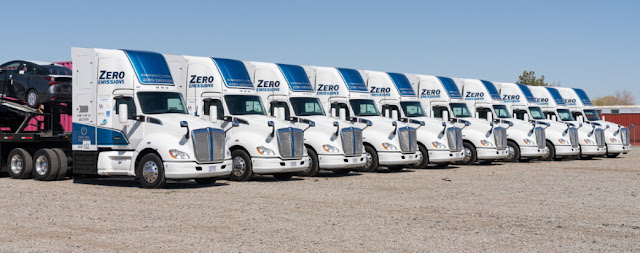Toyota Motor North America and Kenworth Truck Company are proud to announce that they have demonstrated the capabilities of their jointly designed Class 8 Heavy-Duty Fuel Cell Electric Vehicles (FCEV) as a potential zero-emissions alternative to diesel trucks as they complement their nearby zero- and zero-emissions charging facilities. (ZANZEFF) "Shore to Store" in Los Angeles Harbor, Los Angeles Dock, and Inland Empire.
What is the main goal of Toyota and Kenworth's involvement in the project?
The primary goal of Toyota and Kenworth's involvement in the project was to match the performance of diesel-powered dryers with the elimination of emissions to provide a sustainable solution in heavy-duty transportation. The baseline for the Toyota-Kenworth T680 FCEV truck - codenamed "Ocean" - was the 2017 diesel engine that travels about 200 miles per day. The T680 FCEV has a range of approximately 300+ miles when fully loaded to 82,000 lbs. (GCWR), and with no downtime between charging shifts and a short fill time of 15 to 20 minutes, FCEVs can run multiple shifts per day and cover up to 400 to 500 miles. Kenworth designed and built 8-Series T680 FCEVs, while Toyota designed and built the hydrogen fuel cell electric power system for the powertrain. Ocean Trucks has reduced greenhouse gases (GHG) by 74.66 metric tons of CO2 per truck per year compared to its base diesel engine.
What is the result of the success of 10 trucks.
The success of the 10 trucks in real-world customer service was the result of close collaboration between diverse project members, including Kenworth, Toyota, the Port of Los Angeles as project leader, Shell hydrogen fuel infrastructure, and a grant from the California Aviation Resources Board (CARP). The program paves the way for further development and commercial opportunities for hydrogen fuel cell electric transportation in California and beyond. Although their duties on the ZANZEFF "Shore to Store" project officially ended on August 5, 2022, including those that will continue to support Toyota's operations in the Lower LA Basin.
Although the overall ZANZEFF project is expected to be completed later this year, the recently completed "Shore to Store" project funded by ZANZEFF was proposed with the support of
Toyota, Kenworth and Shell and funded with a grant of 41 million Dollars provided by CARB.
The grant was part of California Climate Investments, an initiative in California that places a commercial ceiling of billions for work to reduce greenhouse gas emissions, boost the economy and improve public health and the environment. Shore to the Store has provided one of the largest real-world proof-of-concept test cases to demonstrate the practical application of large-scale hydrogen fuel cell technology in a framework for shipping facilities to structure operations for the future movement of goods from the Shore to the Store in the world.
10 "Ocean" trucks were operated for this project by customers, including, among others, Toyota Logistics Services and Total Transportation Services, Inc. and Southern Counties Express. With the completion of this project, the door is now open for wider adoption of the technology for use in other heavy-duty applications, including the increased use of heavy trucks in commercial transportation.
The Port of Los Angeles is the busiest container port in North America. Mid- and heavy-duty trucks across the state—such as those operating at the port—produce only about 3 percent of all vehicles in California, yet they are responsible for nearly 23 percent of the state's road greenhouse gas emissions. The Port of Los Angeles has announced that it hopes to convert its drying fleets to zero-emission generating sets by 2035 and recently announced a Clean Truck Fund to help support that transition. The port and the surrounding area was an ideal location to display the heavy-duty electric fuel cell trucks as part of the transport operations.
Shell contributed to the project by building a total of three hydrogen stations (two from ZANZEFF and one additional in the operating area), California's first public provider of heavy-duty truck fuel. With designated routes for truck drying operations, stations were used regularly, providing fast refueling to keep the trucks running.







Comments
Post a Comment